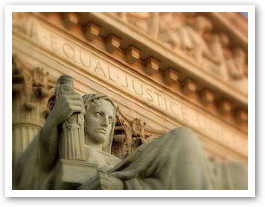Whose Vision of Social Justice?
- COLLEEN CARROLL CAMPBELL
Talk-show host Glenn Beck recently struck a nerve and ratings gold when he urged his audience to abandon any church that espouses social justice.
 |
The term is "code" for extremist political ideas akin to those of Nazis and Communists, Beck said, and churches that use it are promoting "a perversion of the Gospel" that privileges big government over individual charity.
Beck's controversial advice sparked a passionate backlash, particularly from the political left. Leading the boycott-Beck brigade is liberal social activist the Rev. Jim Wallis, who says Christians now should consider Beck's show as obscene and unworthy of their patronage as shock jock Howard Stern's.
"Social justice is an integral part of God's plan for humanity," Wallis wrote on his blog, after admitting that "Christians may disagree about what social justice means in our current political context."
That caveat is crucial, and it's one that politicized pastors like Wallis often forget. A spiritual adviser to President Barack Obama and author of the rather presumptuously titled manifesto God's Politics, Wallis is an intensely partisan critic of those who reject his statist vision of social reform.
He's not the Rev. Jeremiah Wright – a preacher of ranting, anti-American sermons whose Chicago church Obama attended for decades and whom Beck cited as an example of a pastor promoting extremism. But Wallis has his moments of fire-breathing invective, directed almost always at Republican politicians and conservative Christians.
Beck makes his living by making provocative statements, so he probably was not displeased by the attention that Wallis' fury generated for his show. For Wallis, the controversy has given him a bigger platform to plead his case for the inextricable link between a Christian social conscience and leftist public policy. Lost in the fray is an interesting question worth pondering: What's the meaning of social justice?
Anyone who has cracked open a Bible knows that justice is indeed a recurring theme. Calls for a just social order hardly qualify as a "perversion" of a Gospel that emphasizes, again and again, God's concern for the poor and marginalized. A religion premised on the idea of original sin does not promise its adherents a pain-free existence this side of eternity, but neither does it exempt them from the duty to build a better society here and now.
Still, there's a reason that the term "social justice" provokes sighs and rolled eyes among many Christians today. The promotion of leftist politics as infallible religious dogma by pastors such as Wright and, to a lesser extent, Wallis, goes a long way toward explaining public fatigue with the term. That fatigue stretches beyond Protestant circles into Catholic ones, where the phrase has its origins.
The Catholic Catechism defines social justice as a situation in which people are able to "obtain what is their due" and says such justice "can be obtained only in respecting the transcendent dignity of man." The church lays out a few non-negotiable principles when it comes to respecting this personal dignity – defense of the right to life is preeminent among them – while leaving many public policy decisions subject to the prudential judgment of individual Catholics.
Catholicism is not libertarianism by any stretch; government is expected to have a role in protecting the poor and weak. Yet the church also defends the principle of subsidiarity in political life – the idea that the people closest to a problem should be the ones to solve it. |
Catholicism is not libertarianism by any stretch; government is expected to have a role in protecting the poor and weak. Yet the church also defends the principle of subsidiarity in political life – the idea that the people closest to a problem should be the ones to solve it.
Despite these careful doctrinal distinctions, many Catholics – like many mainline Protestants – assume that social justice demands their reflexive support for unlimited expansion of the social welfare state, even when a new government program may not be the most effective way to help the poor. Meanwhile, many of these same Catholics ignore the Church's clear admonition to defend social justice by defending the right to life of the unborn from abortion and the elderly from euthanasia.
The call for social justice is an outgrowth, not a perversion, of the Gospel. But the devil is in the definition. Christians concerned about mission creep in their churches should not abandon social justice. They should fight to reclaim a fuller understanding of it, one independent of any narrowly partisan political agenda.
 This is Meaghen Gonzalez, Editor of CERC. I hope you appreciated this piece. We curate these articles especially for believers like you.
This is Meaghen Gonzalez, Editor of CERC. I hope you appreciated this piece. We curate these articles especially for believers like you.
Please show your appreciation by making a $3 donation. CERC is entirely reader supported.

Acknowledgement
Colleen Carroll Campbell. "Whose Vision of Social Justice?" St. Louis Post-Dispatch (March 18, 2010).
Reprinted with permission of the author, Colleen Carroll Campbell.
photo: Michael Galkovsky (flickr)
The Author
 Colleen Carroll Campbell is an author, print and broadcast journalist and former presidential speechwriter. She is the author of My Sisters the Saints: A Spiritual Memoir and The New Faithful: Why Young Adults Are Embracing Christian Orthodoxy. Her website is here.
Colleen Carroll Campbell is an author, print and broadcast journalist and former presidential speechwriter. She is the author of My Sisters the Saints: A Spiritual Memoir and The New Faithful: Why Young Adults Are Embracing Christian Orthodoxy. Her website is here.





